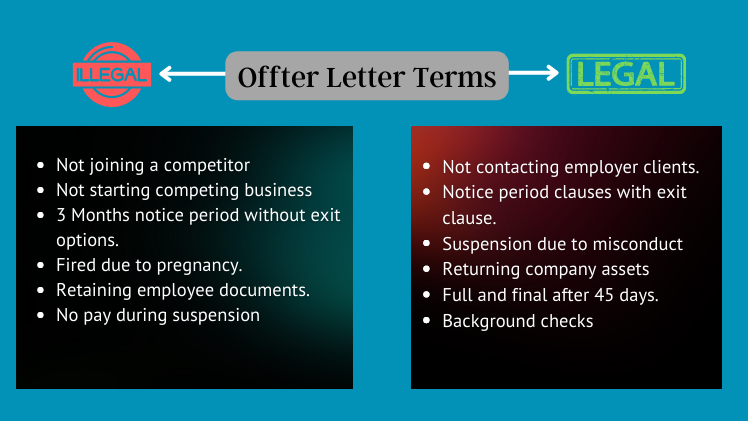Last updated on February 10th, 2024 at 12:26 pm

You are free to use this image on your site, template etc. Just provide us the attribution link
Truth be told, If you are facing this now then you are not alone! So, if you are confused about,notice period buyout laws india then this article is for you.
This ain’t new in India, where a strong employer can arm-twist you into signing things!
I too wasn’t allowed to start a new similar business for 3 years on grounds of a non-compete clause.
So, I am going to discuss some very usual problems, that employees face and how to deal with them effectively.
Also, note that we will focus on the two most important points here which are entry and exit.
notice period buyout laws india
Offer letters & Red flags to watch- Notice Period Laws In India
We are jumping straight to the point directly.
The Offer Letter
Once you get the offer letter from the company, then it’s legally an official invitation.
Do’s: Once you sign the offer letter and give it back to the company, then its binding on you and the company.
Don’ts: Never ever accept the offer and then go missing.
Although this is rampant and many companies will ignore your absence but you don’t want to be the first example of its use.
Plus, you never know, a company could use linked in as a means to showcase this which would result in hurdles later.
The Terms and Conditions
I know, we are excited to see that finely printed offer letter and the big fat numbers on it.
However remember, that devil usually is in the details!
Read each and every term and condition of the offer well, because it can mean a lot of harassment later.
Some Important terms that you need to look out for are:
General Terms Diligence
- What is the probation length?
- What is the resignation policy for probes?
- Is there a termination policy for probes?
- How much is the employer contribution in PF?
- Does the company have a health policy?
- Any provisions for maternity leaves?
- How does the notice period work?
Above, I have discussed some very basic hygiene terms to look out for.
The important ones are, related to the resignation of probes and the length of probation.
Which can be a live saver later!
Let me explain this a little;
Lets say you join a company and are under probabtion for 3 months. However the company states in the offer letter that probees can be terminated without notice.
Which means the resignation of the probees too, might have a similar structure.
Advanced Terms:
Now, each company might have its own restrictive conditions in place.
However what you can and can’t do while in employment.
I have purposely put, it while in employment because that’s crucial.
All the restrictive conditions are applicable only till you are an active employee.
Hence anything that restricts your freedom, once the term is over eventually is against the law!
Not allowed to join a competitor- Non Disclosure
If you get restricted by an employer, who makes you sign the exit forms which have the above clause?
Then please cite this case of the Delhi High Court:
Pepsi Foods Limited & Others Vs. Bharat Coca-Cola Holdings Pvt. Limited
The court order read as follows:
It would almost be a situation of economic terrorism or a situation creating conditions of bonded labour”.
Madras High Court
So, it’s clear I suppose, that no one decides what you do after the termination of your contract.
Restrictions on starting a similar business.
Section 27 of the Indian Contract Act, 1972 states that,
“Agreement in restraint of trade, void – Every agreement by which any one is restrained from exercising a lawful profession, trade or business of any kind, is to that extent void.“
Section 27 Indian Contract Act
This law is followed very strictly in India and courts have almost always ruled in favour of the employee.
In conclusion, the non-compete clause fails big time legally and hence if you do notice this, make sure you get clarification on it.
Bonus Tips
I can just go on and on, about this but just a few hiccups solutions here that might help:
- Make sure you transfer all the assets of the company back.
- Get an acknowledgement of it
- Always have email communication, never oral
Notice period Exit tips
The notice period is usually a space, which might be giving you a lot of sleepless nights.
I can understand that, after all, how on earth are we supposed to find a job?
Now, this space is a little tricky I must declare! At least from the legal perspective.
So, what’s the logic here?
Well, because it’s a contract after all and you agreed to the promise of notifying us 3 months before in return for consideration.
So that makes it legal, but 3 Months notice period can be illegal if there is no exit solution.
For example 3 Months’ notice or pay 2 months’ salary.
Now here is the tip
If you know that you are bound by the 3 months notice period then its best to approach this in the negotiation mindset rather than confrontation
Allen Aravindan,CFA
Also, you need to remember that no company usually would enjoy keeping an employee under 3 months’ notice for long.
Absolutely! You heard that right.
Take some time to recollect, what you did during the notice period.
So, keep your calm, assist in the process of transfer and in between nudge your boss to remind him of the awfully long wait time.
99% of the time, that works.
Else, you can use some black hat strategies which I will refrain from mentioning because everyone knows it very well.
Experience letter
Often, you might be worried that in case your exit is not peaceful.
Which by the way most of the time is not.
Then how to get hold of important documents like the experience letter, or the resignation confirmation?
Well, let me give you a tip here again!
You don’t need an expereince letter to get employment somewhere else, but all you need is the original offer letter.
Suspension
Moreover, let’s say that a recruiter insists on getting a resignation letter then in most cases your final email of resignation will suffice.
Again, what’s the logic here?
Simple, because the need for an experience letter is simply to confirm if you are indulging in dual employment or not.
So, the best approach is to discuss this with your prospective employer and figure out ways to substitute the document.
Data transfer and property
This might sound like inception but since this is a touchy subject legally, hence spending some more time here.
Any property, and by any I literally mean any, if under your possession while exiting the company should be returned immediately period.
Why? Because, is theirs and plus they can claim theft, breach of contract and whatnot. So create a checklist and make sure to get a confirmation of your receipt.
The minute you get the acknowledgement of your clearance, you are now free from all the terms of the contract.
Apart from any fraudulent activities that might have happened, there is nothing that can be claimed against you.
Starting a new business
So, this is a place of contention and the lines are not very clear here.
So, let's see it this way, there can be only two ways
- You are intending to prepare to go to business in the correct mindset with your own resources
- Or you are using your current employer's time and resources to start your business.
Whether the business is competing or not competing is out of the question because section 27 clearly gives us immunity.
However, you must ensure that whatever preparations and ideations or pilots you are conducting are either approved or are done in your personal time.
Moreover, make sure that it appears and is in the pilot stage.
This means, no legal registration of the business, no bank accounts, and no money involved.
The last point is important, the no money point, because as soon as there is consideration involved.
It would certainly be a breach of contract because you are pursuing dual employment.
So here is my tip again,
If your business is not directly competing then disclosing is best. However in case of competing, its best to pursue the pilot strategy.
Now, that might have scared you a lot but here is a caveat.
The majority of suits against employees starting competing businesses even with preparation have not been held in court.
This means the court says "Buzz off".
notice period buyout laws india
In India, the notice period buyout laws are determined by the Indian Contract Act, 1872, the Shops and Establishment Act of the state where the company is located and the company's internal policies.
The Indian Contract Act, 1872, states that an agreement to shorten the notice period can only be made between the employer and employee, and it must be done in writing. The agreement must also be signed by both parties and must be in compliance with any other laws or regulations that apply.
The Shops and Establishment Act of the state where the company is located also lays out the notice period requirements for employees. The notice period can vary depending on the state and the type of company. For example, it is usually 30 days for private sector companies, but it can be shorter for certain types of employees or in certain circumstances.
In addition, many companies in India have their internal policies that govern the notice period buyout process. These policies may include specific procedures for buying out the notice period, as well as guidelines on how much the buyout will cost.
It's important to note that the laws and regulations regarding notice period buyouts in India can be complex and vary depending on the state, company and the role of the employee. It's best to check with the company's HR department or a legal professional for specific information.
In summary, In India, the notice period buyout laws are determined by the Indian Contract Act, 1872, the Shops and Establishment Act of the state where the company is located and the company's internal policies. The agreement to shorten the notice period must be done in writing, signed by both parties and be in compliance with other laws and regulations.
Conclusion
Working with an employer can be tricky business and it always is.
Never underestimate the mess that can get created, in spite of the fact that you might be drinking beer two times a week with them.
When things get ugly, always everyone will try to protect their own interest first.
So, there should be no guilt in saving yours from the start.
Ciao!




